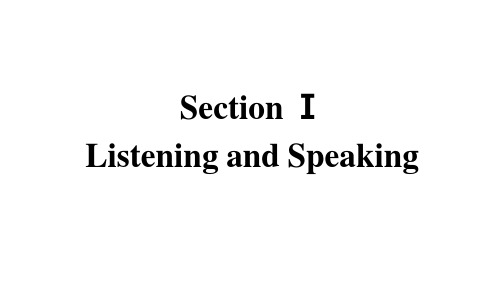新教材高中英语UNIT5Languagesaroundtheworld(一)ListeningandSpeaking课时跟踪检测新人教版必修第一册
新教材高中英语UNIT5LanguagesaroundtheworldSectionⅠListeningandSpeaking课件新人教版必修第一册 (1)

把……提交给……;把……委托给……
refer to ... as
把……当(称)作
①You know who I am referring to. 你知道我指的是谁。
②The person referred to at the conference just now is an expert in this field. 刚才在会上提到的那个人是这个领域的专家。
in the future.
( T)
4 . One American girl chose to learn Danish because her
频繁的交流和毅力终于得到了回报,渐渐地她开始能用英语表 达自己,这个坚定的农妇自此之后又接连学会了其他多种语言。
“月亮妈妈”的行为很好地诠释了阳朔农民的中国梦——通 过学习新的技能让生活变得更好。
Section Ⅰ Listening and Speaking
The real happiness doesn't lie in money or success or fame. Real happiness lies in gratitude. So be grateful. Be alive. And live every moment.
Yangshuo, a backpackers' mecca in south China's Guangxi
Zhuang Autonomous Region.
Xu lives at the foot of Moon Mountain, a
tourist
attraction② in Yangshuo, where she has guided countless tourists.
Unit5LanguagesAroundtheWorld(课件)

句式 12:形式倒装
1. 智慧和努力对于成功同样重要。
Equally important for success are wisdom and efforts.
2. 在我看来,保持在线学习和我们生活的平衡非常重要。 From my point of view,of great significance is keeping the balance between online learning and our life.
3. 浏览英语学习网站对英语学习非常有益。 Of great benefit to their English studies is visiting English learning websites.
四 续写赋能练习
(2017,6月浙江) A Brave Escape
麦克正沿着山路骑行,突然他看到一只狼张着血盆大口追赶他。他的恐惧无以言表。他乞 求路过的司机帮助他,但是徒劳无果。因此,他毫不犹豫地从自行车上下来,抓住自行车,用 尽全力把自行车扔向狼,尽力把狼吓走。他正要成为狼的盘中餐时,他的朋友加入了他。当他 向朋友描述这件恐怖的事情时,他仍然感到毛骨悚然。
随着年龄的增长,她对语言的迷 恋成为全球性的事情。她赞赏人们在 寻求掌握新语言时所面临的具体困难。 梅明白词汇的重要性以及弥合不同文 化之间差距的需求。在大学学期,梅 遇到了新的挑战。她意识到语言不仅 仅是关于文字,而是关于理解和平等。 这是一种与他人联系并理解他们的故 事的方式。她明白语言是一种强大的 工具,就像汽油一样,可以促进人与 人之间的联系。
As Mei grew older, her fascination with languages became a global affair. She appreciated the specific struggles people faced in their quest to master a new tongue. Mei understood the importance of vocabulary and the demand to bridge the gap between different cultures. During her college semester, Mei encountered new challenges. She realized that language was not just about words, but about understanding and equality. It was a way to relate to others and understand their stories. She understood that language was a powerful tool, like petrol that fueled connections between people.
Unit5 Languages around the World高一英语(人教版2019必修第一册)

English and Maori
(New Zealand)
Korean (Korea)
How to say “Hello” in different languages ?
中国:你好 Hello,hi 韩语: 안녕하세요 法语:Bonjour
Hallo 俄语: привет こんにちは 阿拉伯语: مرحبا 牙语: Olá 荷兰语: Hallo 牙语: ¡Buenas!
Around 2.8 billion.
4.What is the attitude of the speaker towards foreign language learning?
It’s very useful to learn one or more foreign languages.
4. Listen to the speech again. What do the italicised words refer to in the sentences?
1 They think it means better job
chances in the future.
Reference
They: students who choose to study
Pronouns (it, they, she, etc.) refer to something or
a UN language.
hello
The CN Tower 1 The Brandenburg Gate
The Louvre Museum
Red Square
The Taj Mahal
The Royal Palace of Madrid
高一英语Unit5Languagesaroundtheworld课件新人教版必修第一册

Foreign kids are keen on learning Chinese Nowadays, with the development of China, Chinese is becoming an important language in the world. More and more children in foreign countries are learning Chinese, especially in rich families.
During one of Trump’s visits to China, he showed the video of his granddaughter Arabella singing Our Fields, Beautiful Fields and My Good Mom. The six - year - old also displayed her knowledge about Chinese literature by reciting Three-Character Scripture, a Confucianist volume(一 卷)to educate young children, and two ancient poems of Li Bai, Watching the Fall of Lushan Mountain and Departing from Baidi City in the Morning.
Billionaire Mark Zuckerberg picked up Mandarin (普通话) a few years ago, and improved so much that he was able to do a 30-minute question and answer session(一段时间) in the language. His wife, Priscilla Chan, speaks fluent Cantonese(粤语). The couple have already introduced Mandarin into the house for their daughters. Mark has spent a large sum of money for a babysitter who can speak Chinese.
人教版高中英语必修第一册 UNIT 5 LANGUAGES AROUND THE WORLD Ⅰ

3.重音
英式英语习惯把单词的主重音放在后面的音节上,而美式英
语则把主重音放在前面的音节上。尤其是以-ary,-ory结尾的
单词。
BrE
AmE
la̍boratory
̍laboratory
dic̍tate
̍dictate
̩ciga̍rette
̍cigarette
4.英式英语中的/j/音在美式英语中逐渐失去发音
重点短语
1.refer to 指的是;描述;提到;查阅
2.pay attention to 注意
1.【教材原文】How many billion people speak the
UN’s official languages as their native or second
language?(page 60)
Section Ⅰ
Listening and Speaking
重点单词
1. billion n.十亿
2. native adj.出生地的;本地的,土著的 n.本地人
3. attitude n.态度;看法
词汇拓展
refer vi.提到;参考;查阅 vt.查询;叫……求助于
→ reference n.指称关系;参考
语境领悟
朗读下列单词,感悟英式英语和美式英语发音的不同。
/ə̍ɑːəʊ/
/ɒ/
tomato
not
/ɑː/
/ə̍ʊ/
/̍ɑː/
/̍əʊ/
mobile
sample
/̍æ/
/̍ʊ/
/̍ː/
student
/̍ː/
语境领悟
(1)We should have a positive attitude to life.
Unit5LanguagesAroundtheWorld词汇课件-高一英语人教版【精美】

【名师点津】
“a variety of+复数名词”用作主语, 谓语要用复数; “
”
用作主语, 谓语要用单数。
21. major [ˈmeɪdʒə(r)]
21. major adj. 主要的; 重要的; 大的 n. 主修课程; 主修学生 vi. 主修; 专门研究
【词块积累】
(1)major in
主修……; 以……为专业
4. refer to [rɪˈfɜː(r)]
4. refer to指的是; 描述; 提到; 查阅 (3) 查阅,参考 You can refer to my notes. 你可以参考我的笔记。 refer to+所查的工具书和资料(词典、笔记和参考书) look up+word、phrase等需要查找的对象 Eg: if you don’t know what it means, refer to the dictionary.=if you don’t know what it means, look it up in the dictionary.
6. system [ˈsɪstəm]n. 体系,制度,系统
7.despite [dɪˈspaɪt]
7. despite prep. 即使; 尽管 【词块积累】 (1)in spite of(=despite)+名词/名词性短语 in spite of/despite the fact that+句子 (2)although/though+句子
5. reference [ˈrefrəns] n.参考; 指称关系
in/with reference to (所述内容)关于 for future reference供日后参考 reference book参考书
Unit+5+Languages+Around+the+World+Listening+and课件
Listening and Talking
1. What are the different kinds of English mentioned? There are many different kinds of English around the world, ___Br_it_is_h_E_n_g_li_sh___, __A_m_e_r_ic_a_n_E_n_g_lis_h__, _____A_u_st_r_al_ia_n_E_n_g_li_sh___ and many others. 2. In what ways are these kinds of English different from each other? Are these differences great? There are differences in vocabulary, pronunciation and grammar, but those are usually not big problems.
What are the two pairs of words that the student is
confused by? Listen and tick them in the boxes.
✔ semester/term
restroom/toilet
gas/petrol
✔ subway/underground
characters are mentioned in the video?
√ A. Three B. Four
C. Five
2. Today, written Chinese is the ______ system of writing
in the world.
人教版(2023)必修第一册 Unit 5 languages around the world L
人教版(2023)必修第一册Unit 5 languages around the world Listening and talking 教学设计Unit5口语课教案Exploring Different Kinds of EnglishTeaching Objectives:1. To develop students' listening, speaking, reading, and writing skills in English.2. To help students understand the different types of English (e.g., academic, business, casual, technical) and their respective contexts.3. To enhance students' cultural awareness and global perspectives through the study of English.4. To prepare students for college entrance exams and future academic and professional pursuits.Teaching Key Points:1. The definition and characteristics of different types of English.2. Examples of each type of English in real-life situations.3. Strategies to improve language proficiency in each type of English.4. The role of English in a globalized world.Teaching Difficulties:1. Students may find it challenging to differentiate between the various types of English in different contexts.2. Students may struggle to apply the strategies to their own language learning.3. Students may have difficulty understanding the cultural implications of using different types of English in certain situations.Student Analysis:The class consists of junior and senior high school students who have a basic level of English proficiency but varying levels of confidence in using the language. Most students are eager to learn and participate in class activities, but some may feel overwhelmed or unsure about their abilities.Teaching Methods:1. Lecture: Introduce the concept of different types of English and their characteristics. Use visual aids and real-life examples to illustrate points.2. Group Discussion: Encourage students to share their experiences with different types of English they encounter in daily life or during travels. Analyze and compare the examples given by different students.3. Role-play: Divide students into pairs or small groups and assign them roles based on the type of English they need to use (e.g., academic presentation, job interview). Give them time to prepare and practice their performances in front of the class.4. Cultural Insight: Discuss the cultural implications of using different types of English in various situations, such as business negotiations or social events. Use multimedia resources to explore the cultural backgrounds of English-speaking countries.5. Self-assessment: Assign quizzes or written assignments that test students' understanding of different types of English and their application skills. Offer feedback and guidance for improvement.6. Homework: Ask students to write short essays on how they use English in their daily lives, highlighting the differences between academic, business, casual, and technical English. Provide feedback on their essays and encourage them to continue practicing their language skills outside the classroom.Learning Activities:Introduction (5 minutes)1. Begin the class by asking students what they know about different types of English and why they are interested in learning about them.2. Introduce the concept of differentiating between various types of English based on context, situational requirements, and intended audiences.3. Present an example of each type of English (e.g., academic, business, casual, technical) and ask students to identify its characteristics and usage scenarios.4. Invite a few students to share their thoughts on the importance of understanding different types of English in today's globalized world. Group Discussion (20 minutes)1. Divide students into small groups (3-4 students per group). Assign each group a specific type of English (e.g., academic, business, casual, technical).2. Ask each group to discuss their assigned type of English and share their personal experiences or observations related to it. Encourage them to provide examples from real-life situations or events they have witnessed or participated in.3. After the group discussion, facilitate a larger class discussion by asking each group to report on their findings and share insights with the rest of the class. Facilitate a Q&A session to clarify any misunderstandings or questions raised by other students.Culture Insight (15 minutes)1. Introduce a specific type of English (e.g., academic) and discuss its cultural significance in a particular context (e.g., academia). Use multimedia resources to provide visual aids and examples related to this topic.2. Ask students to reflect on how this type of English might differ from other forms they have learned before (e.g., business, casual). Ask them to consider factors such as tone, register, vocabulary, and grammar whenanalyzing these differences in contextual usage scenarios.3. Encourage students to think critically about how cultural differences can impact communication across different types of English in various settings (e.g., international conferences, job interviews). Discuss potential challenges and opportunities that arise from these cross-cultural interactions and how they can be navigated effectively in professional settings or personal relationships with people from diverse backgrounds.Self-assessment (10 minutes)Assign a quiz or written assignment that tests students' understanding of different types of English and their ability to apply them effectively in various situations (e.g., multiple-choice questions, short answer questions). Include questions on contextual usage scenarios and cultural nuances related to each type of English.。
人教版高中英语必修一Unit5LanguagesAroundtheWorld重点归纳笔记(带答案)
人教版高中英语必修一Unit5LanguagesAroundtheWorld重点归纳笔记单选题1、The accident has reached to the point ________both their parents are to be called in.A.for whichB.whenC.whichD.where答案:D考查定语从句。
句意:事情发展到如此地步,不得不请双方家长来一趟了。
分析句子结构可知,这是一个限制性定语从句,先行词point在从句中作地点状语,应该用关系副词where引导从句。
故选D项。
2、The reason ________ he has been such a success is________he never gives up.A.why, becauseB.that, whatC.that, thatD.why, that答案:D考查定语从句和表语从句。
句意:他如此成功的原因是他从不放弃。
分析句子结构可知,“he has been such a success”是定语从句,从句中不缺主语或宾语,先行词reason是原因,因此第一空用关系副词why,“he never gives up”是表语从句,从句中不缺主语或宾语,且句子意思完整,因此第二空用that引导表语从句,故选D。
3、Unsuccessful people can always find reasons ________ they’re not doing well.A.for whichB.thatC.of whichD.where答案:A考查定语从句。
句意:没有成功的人总是能找到他们做不好的理由。
分析句子结构可知,空格前reasons作先行词,空格处应填定语从句的引导词,分析从句成分可知,从句中缺少状语,所以应用why或for which引导定语从句。
故选A。
4、She always considers her best friend as someone________ she can share everything.A.about whomB.with whomC.with whichD.about which答案:B考查定语从句。
人教版必修第一册Unit5LanguagesAroundtheWorld课件(1)
Unit 5 Languages around the world 7.There are many reasons why this has been possible, but one of the main factors has been the Chinese writing system.
23.We offer courses that relate English literature to other subjects. 我们提供(把英国文学和其他学科联系起来的)课程。 24.He appreciated his teacher pointing out his mistakes in his composition. 他很感激老师指出他作文中的错误。 25.I’d appreciate it if you could give me the opportunity. 我将不胜感激如果你能给我这个机会。
Unit 5 Languages around the world 1. Official languages of the United Nations are spoken by2.8 billion people as their native or second language.
联合国官方语言被28亿人讲作为他们的母语或第二种语言。
在极其炎热的夏天,空调的需求量很大。 34. He gave us a brief description of the tXXXami. =He described the tXXXami to us briefly.
他简要地向我们描述了一下海啸。 35. That writing system was of great importance in uniting the Chinese people and culture. 这个书写体系很重要在联合中国人和中国文化。
- 1、下载文档前请自行甄别文档内容的完整性,平台不提供额外的编辑、内容补充、找答案等附加服务。
- 2、"仅部分预览"的文档,不可在线预览部分如存在完整性等问题,可反馈申请退款(可完整预览的文档不适用该条件!)。
- 3、如文档侵犯您的权益,请联系客服反馈,我们会尽快为您处理(人工客服工作时间:9:00-18:30)。
课时跟踪检测(一) Listening and Speaking一、听力强化训练Ⅰ.听下面的单词,然后从A至H中选出与①至⑧中意思相同的单词。
①petrol A.eraser②flat B.gas③colour C.apartment④lift D.elevator⑤rubber E.honour⑥honour F.colour⑦pictures G.photos⑧underground H.subway①~⑤__________ ⑥~⑧__________答案:①~⑤BCFDA ⑥~⑧EGHⅡ.听力训练(一)听第1段材料,回答第1至4题。
1.Where did the man spend his vacation?A.In Hangzhou. B.In Beijing. C.In Guizhou. 2.Why did the woman go to Shanghai?A.To visit a friend.B.To find a job.C.To go sightseeing.3.Where does the woman prefer to live?A.In Beijing. B.In Shanghai. C.In Guizhou. 4.What does the woman think of men from Shanghai?A.They are generous.B.They are friendly.C.They are helpful.(二)听第2段材料,回答第5至7题。
5.What does the woman think of her present job?A.It's interesting.B.It's wellpaid.C.It's boring.6.Which languages is the woman good at?A.French and German.B.English and French.C.English and Chinese.7.Which benefit does the job offer?A.Health care. B.Free travel. C.Paid leave.(三)听第3段材料,回答第8至10题。
8.Where does this conversation probably take place?A.At the woman's house.B.At a hospital.C.At a restaurant.9.What kind of diet should the man follow?A.A moderate diet with careful eating habits.B.A very restrictive diet eating only salad.C.A strict diet eating only once a day.10.What will most likely happen to the man on the diet?A.He will lose some weight during his diet.B.He will lose weight quickly.C.He will not lose weight.答案:1~5 CBACC 6~10 AACAC附:听力材料(Text 1)W: Hi, George! Welcome back from summer vacation. Did you have a good time in Guizhou?M: Yes, I did. It was everything I expected, and more. How about you? Did you go anywhere?W: Yes, as a matter of fact I did. I spent a week in Shanghai trying to get a job there.M: Shanghai is such a wonderful city! You'll really enjoy living there.W: I'm not so sure. Shanghai has a lot going for it, but I like Beijing too.M: What do you like best about Shanghai?W: Shanghai is the business center of China, so there are lots of jobs, and there's always something new. It's more modern than Beijing and generally a convenient place to live.M: Why would you want to stay in Beijing?W: For one thing, Beijing has a sense of history. You know, there's no Great Wall in Shanghai!M: That's for sure. There's no Forbidden City or Summer Palace, either.W: For another thing, I think people are very friendly in Beijing.M: Yes, I can't agree more. People from Beijing are really friendly!W: But I've heard that men from Shanghai will help their wives with housework. That's the very quality I admire!(Text 2)W: I'm tired of my job. Everything is just the same.M: Hey, you know what? I think this is a perfect job for you in the paper today.W: What?M: Ah, here it is. European Space Agency needs translators.W: European Space Agency? I don't know whether I'm the one.M: That's what they say here. They need French and German translators.W: I'm good at both. What else are they asking for?M: A degree and at least three years of working experience.W: What about the pay?M: Well, it says it depends on education and experience. And there are other benefits. Have a look at it yourself.W: Mm, health care and paid training. Oh, this isn't bad. Maybe I should write them straight away.M: You certainly should.(Text 3)W: Are you being served, Sir? Now, what would you like to have?M: I think I'll just have a salad and a cup of coffee.W: Is that all?M: Yes, I'm on a diet. My doctor told me I should lose some weight.W: What do you think of that then?M: It's all right with me. In fact, I've never felt better. Furthermore, some of my old clothes would fit me if I lost about fifteen pounds.W: How long will that take?M: Well, I've just started my diet. It may take me six months to get down to my proper weight.W: Do you plan to eat nothing but salad for six months?M: No, I'll eat fruit and certain meat and dairy products, but I should not eat anything between meals and I should not eat anything containing sugar.W: Then you probably won't want to try the delicious pastries we serve here; the head cook is an excellent pastry chef.M: Um ... Now that you mention it, I may try six or seven on the menu. I usually have more.二、语言基础训练Ⅰ.单词拼写1.Australians are justly proud of their native (当地的) wildlife.2.They've spent nearly a billion (十亿) dollars on the research already.3.People should have a responsible attitude (态度) towards marriage and relationships.4.The teacher referred (提到) to in my last letter has gone abroad.Ⅱ.单句语法填空1.There is a great difference in attitudes to/toward what one eats between the rich and the poor.2.The new law didn't refer to land used for farming.3.He used to_sleep (sleep) late in the morning. Now he has got used to getting (get) up early.4.After living among the natives (native) for twenty years, the painter forgot his own language.5.Neither the students nor the teacher is (be) content with the result.Ⅲ.完成句子1.With the teacher's encouragement, he gradually developed a_positive_attitude_towards/to_life.在老师的鼓励下,他逐渐对生活有了积极的态度。
